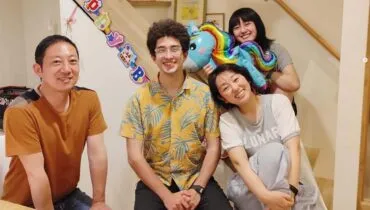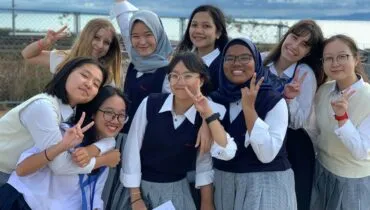Tea ceremonies, graceful gardens and tranquil temples along with high-speed trains, striking efficiency and hyper-modern skyscrapers are essential to the dynamic Japanese culture.
Country Language: Japanese
Country Language: Japanese

During the programme you will stay with a Japanese host family for complete immersion in the culture and language.
Students can be placed in any area – large cities, suburban areas and rural areas.
Most families are traditional nuclear families, however, students can be placed in any type of family, including a family without children, a one-parent family with children, or a retired couple.

A participant’s date of birth must be between 2 Apr 2009 to 1 Apr 2011
Participant Age Range Upon Arrival: 15 years 5 months to 17 years 4 months
Basic English is the minimum requirement if the participant does not speak Japanese.
No specific level of Japanese is required upon arrival.

Education and academic achievement are top priorities in Japan. Schools in Japan run from April to March (Monday to Friday, 8.30 am to 3.30 pm). You will wear a uniform and commute by bike, bus or train. All students take part in a school cultural festival and a sports festival which are held every year. After the school day ends, you’ll participate in a tradition called souji, when everyone gets together for 30 minutes to help clean the school and grounds. You can also join other extracurricular clubs and activities.
Please see the attached AFS Japan Handbook, which will answer most of your questions about living in Japan.
You can also read the Japan destination page for some more general information.
Any other questions? Contact us at [email protected] and we will get back to you as soon as possible.

By studying at a local high school in Japan and living with an AFS host family, you’ll be fully immersed in daily Japanese life, allowing you to gradually become part of the culture. This deep level of immersion is one of the best ways to achieve fluency in Japanese.
As a high school student in Japan, much of your social interactions will take place at school. Many exchange students form friendships and learn more about Japanese traditions by joining after-school activities, such as calligraphy or kendo, a contemporary Japanese martial art.
In Japan, education and academic success are highly valued. Interestingly, high school isn’t compulsory; instead, it’s a voluntary choice students make. Teachers hold a position of great respect, and this academically rigorous study abroad experience offers excellent language-learning opportunities, as all classes, including English, are conducted in Japanese. School typically runs Monday through Friday from 8:30 am to about 3:30 pm, with some schools holding Saturday morning classes as well.
The academic year in Japan spans from April to March. You’ll likely wear a uniform and commute to school by bike, bus, or train. At the end of each school day, students participate in “souji,” a tradition where everyone pitches in for 30 minutes to clean the school and its grounds. Throughout the year, you’ll experience cultural activities like Bunkasai (school festival), Tai’ikusai (sports day), chorus competitions, and excursions. Optional school trips offer opportunities to visit popular tourist destinations in Japan and, occasionally, even overseas.
This school based programme has been AFS-JPN’s core hosting programme since 1963. It provides students with an opportunity to learn about Japan and the Japanese language by living with a host family, being part of a community and attending classes at a local senior high school. Students are placed with a volunteer (non-paid) host family and go to a public/private senior high school. Students are expected to attend school on a regular basis, and show continued effort to their assigned school work.
While most students go to ordinary senior high schools, some go to secondary schools (a combination of junior and senior high schools) or Colleges of Technology (KOSEN, a combination of senior high school and junior college which focus on engineering). In any case, students attend classes of Grade 10-12th (most likely 10th or 11th). Some private schools have religious backgrounds and students may be asked to take part in religious activities as a part of school life. In addition, 20-30% of AFS host schools are boys/girl’s schools.
Fill out the form and AFS Wales will get back to you soon.
Arrival: 19 Aug 2026
Departure: 20 Dec 2026
This programme’s base cost is £6500 + £2000 for flights.
Application deadline: 13th February 2026